Free Cybersecurity Course
Enter the cybersecurity field with our free introductory course. Learn the basics and build a strong foundation.
Ethical hackers, also known as penetration testers, have what many consider to be a dream job—they get paid by companies to try and hack into their own security systems, as a way of exposing vulnerabilities before actual hackers find them. And ethical hackers are increasingly in demand as companies large and small become more concerned with their cybersecurity infrastructure. Data, systems, and networks must be protected from malicious hackers, and the only way to do this is to have someone on the inside who knows how to exploit weaknesses and strengthen security.
Want to become a successful ethical hacker and stand out from the competition? This article is for you. We’ll explore the steps to take, the qualifications to look for, and the potential salary and career outlook. Read on!
What Does an Ethical Hacker Do?
An ethical hacker is a computer security professional who uses their technical knowledge and expertise to protect companies and organizations from malicious attacks. They use various ethical hacking tools, techniques, and strategies to discover existing security flaws and evaluate the effectiveness of existing security measures.
How To Become an Ethical Hacker
In this section, we’ll explore the various steps an aspiring ethical hacker needs to take to ensure their success, from ethical hacking skills and abilities required to essential programming languages and education.
-
Complete a Course
-
Get Familiar With the Industry and the Fundamentals
-
Invest in Education, Training, and Learning
-
Learn the Essential Programming Languages
-
Hone Your Skillset
-
Get Experienced and Build Your Portfolio
-
Pursue an Internship
-
Find a Mentor
-
Get Certified
-
Your Network Is Your Net Worth
-
Polish Your Resume, Apply for Entry-Level Roles and Start Climbing
Complete a Course
An online course or bootcamp in cybersecurity is a great way to kickstart your career. With support from cybersecurity professionals, practical exercises, career advice and even job opportunities, you will leave equipped with everything you need to launch a profitable career in cybersecurity.
Get Familiar With the Industry and the Fundamentals

The ethical hacking industry is an ever-changing and highly technical field, and it is imperative for anyone interested in becoming an ethical hacker to become familiar with its fundamentals.
It helps them to develop a solid knowledge base to build upon as they progress in their career. It also helps them to understand the various tools, techniques, and strategies used to identify and resolve security vulnerabilities in a system.
Furthermore, knowledge of the industry and its fundamentals can help ethical hackers better understand the consequences of their actions and the importance of protecting the privacy and security of their clients.
Invest in Education, Training, and Learning
Ethical hacking requires a strong technical knowledge of computer systems, networks, and best security practices. To obtain the necessary skills and knowledge, a person must pursue formal education, such as a degree in computer science, or pursue a specialized certification in ethical hacking.
University Degree
A college degree is not required to become an ethical hacker. However, it can be beneficial. A university degree provides an ethical hacker with a solid computer science knowledge base, which can be used to help analyze and understand the attack vectors used by malicious hackers. If this option suits you, consider pursuing degrees in computer science, information security, information systems, cybersecurity, computer engineering, or mathematics.
Bootcamps
The best cybersecurity bootcamps provide an immersive learning environment tailored to the needs of aspiring ethical hackers. These bootcamps give you access to courses covering essential technical and theoretical topics that a hacker needs to understand, such as network security, computer forensics, and programming.
More than that, bootcamps allow networking with other students and cybersecurity professionals, increasing the chances of finding employment as an ethical hacker.
Online Courses and Resources
Online courses, such as the Springboard Cybersecurity Career Track, help aspiring ethical hackers gain the knowledge and networking skills needed to excel in the data science field. They also allow you to practice your skills in a simulated environment and apply your newfound skills to real-life situations.
Learn the Essential Programming Languages
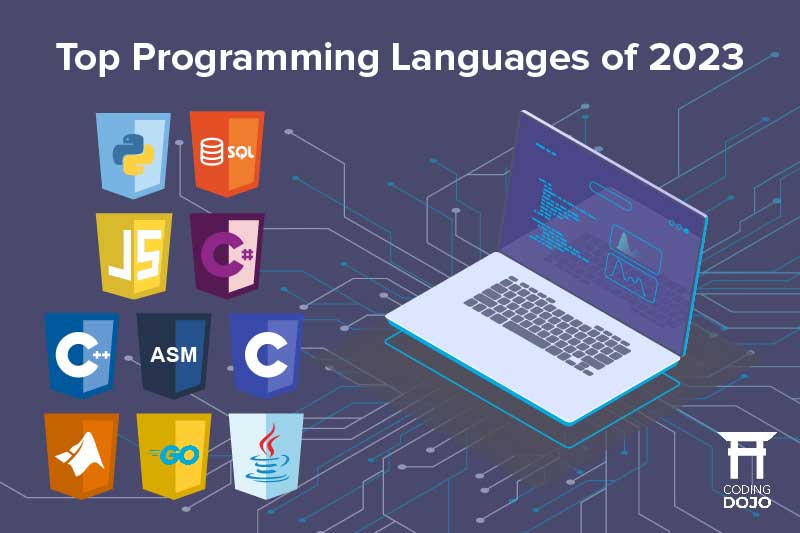
If you’re looking to break into the world of ethical hacking, it’s crucial to have a solid understanding of the various programming languages that can help you succeed.
Python
Python is a programming language used by ethical hackers to develop scripts and tools used in penetration testing. It allows ethical hackers to write scripts to perform network scanning, port scanning, web application testing, and vulnerability scanning.
C and C++
C and C++ are two of the most popular programming languages and are commonly used by ethical hackers to create exploit code and testing tools. C is a general-purpose language used for systems programmings, such as operating systems and device drivers. It is procedural language, meaning it follows a set of instructions for completing a task. C++ is an object-oriented language, meaning it is based on objects and classes. It is used to create more complex software programs.
PHP
PHP has many functions and capabilities that make it useful for ethical hacking tasks, such as scanning web pages for vulnerabilities and writing scripts to exploit them. It can be used to write scripts that automate routine tasks, allowing ethical hackers to focus on more complex tasks.
SQL
Ethical hackers use SQL to access data such as user credentials and other sensitive information. SQL enables the hacker to query, insert, delete, update, and modify data in a database. By using SQL, ethical hackers can analyze data for vulnerabilities and security flaws and gain access to restricted data.
Others
Besides the programming languages mentioned above, ethical hackers should also have basic concepts and knowledge of languages such as Java, Ruby, Swift, Rust, and Assembly.
Hone Your Skillset
To become an ethical hacker, you’ll need both technical and soft skills.
Technical Skills
Ethical hackers need a variety of technical skills. They need to be proficient in programming languages such as Python, C/C++, Java, and JavaScript. But they also need to understand network protocols and architecture and identify vulnerabilities. Advanced computer knowledge is also essential.
Soft Skills
In addition to technical skills, ethical hackers must be creative and have problem-solving skills. They must also have good communication skills and a strong sense of ethics. Moreover, ethical hackers must understand the organization’s security policies and procedures to identify potential threats and vulnerabilities.
Get Experienced and Build Your Portfolio

Getting practical experience and building your portfolio are crucial steps for anyone looking to become an ethical hacker, as it demonstrates your skills and knowledge to potential employers. Here are some tips you can follow to acquire practical experience and build a great portfolio.
Hackathons
Hackathons allow you to practice and refine your skills in a safe, controlled environment. You can work with experienced ethical hackers who can help you learn the ropes and give you tips on how to be an effective ethical hacker.
Open-Source Projects
Working with open-source projects is a great way to become an ethical hacker, as it helps you gain valuable experience with different communication systems and technologies. Open-source projects often provide source code and other resources to help you learn and practice hacking techniques, allowing you to develop your skills and hone your craft.
Bug Bounty Programs
Bug bounty programs are programs in which companies offer rewards for individuals who discover and report security vulnerabilities within their products and services. Participating in bug bounty programs provides an opportunity to gain recognition from the company and the ethical hacker community. Plus, you’ll earn a hefty sum if the vulnerability proves to be critical.
Volunteer Work
By volunteering, you can demonstrate your commitment to ethical practices and ability to work collaboratively and with integrity. This experience can be invaluable when applying for ethical hacking positions.
Pursue an Internship
An internship can provide invaluable experience in the field of ethical hacking. Interns may gain hands-on experience in ethical hacking techniques, such as penetration testing, vulnerability analysis, and incident response. They may also work with security professionals and learn more about existing security controls.
Find a Mentor
Mentors can help you develop your programming skills and provide tips on staying up to date with the ever-changing landscape of ethical hacking. They can also help you understand the ethical implications of your actions and provide insight into the industry’s latest trends and best practices.
Get Certified
An ethical hacking certification is vital in demonstrating your knowledge and expertise. Here are a few you could pursue.
CompTIA Security+

CompTIA Security+ is an internationally recognized certification designed to certify an individual’s competency in system security and network security. The certification proves a technical understanding of secure network and system administration, risk management, and incident response. It is an excellent certification exam for ethical hackers because it provides the cybersecurity skills and knowledge necessary to identify, mitigate, and prevent security threats in an organization.
GIAC Penetration Tester (GPEN)
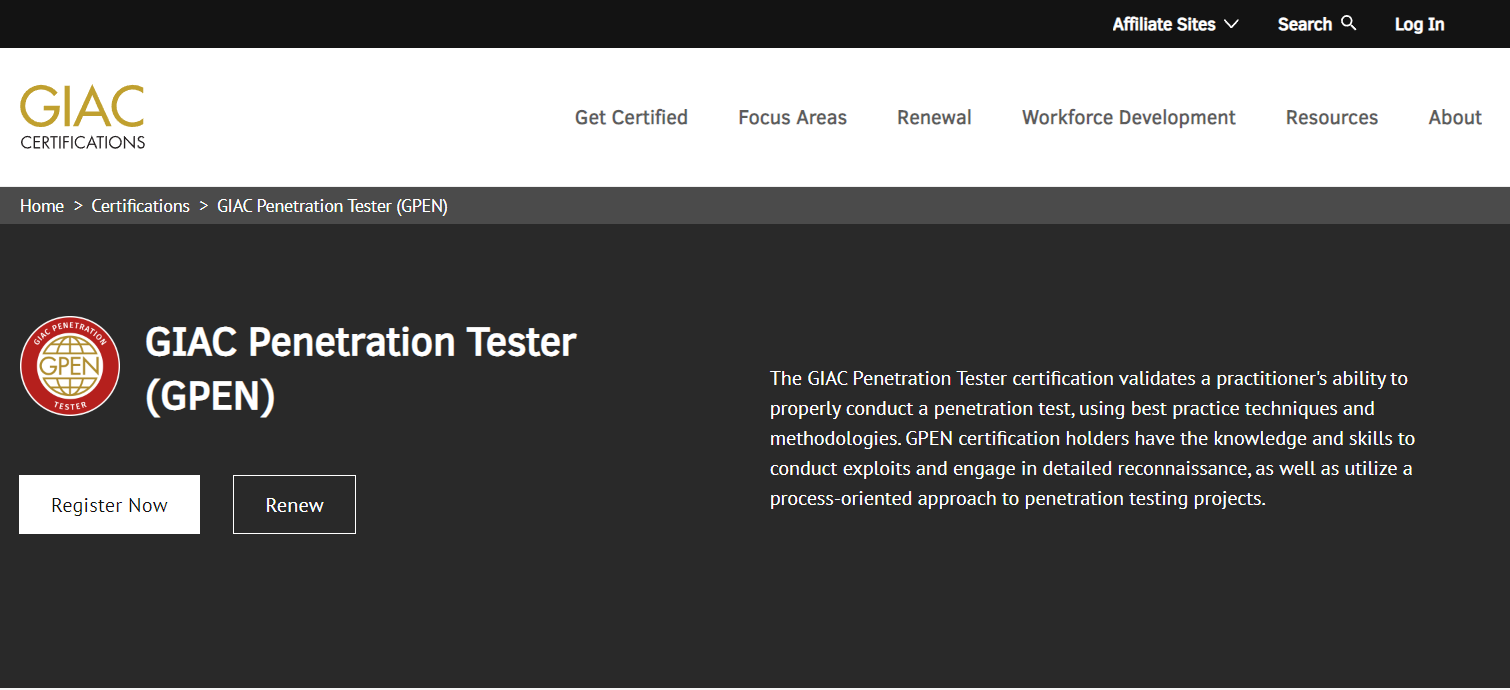
The GIAC Penetration Tester (GPEN) certification is a credential for ethical hackers specializing in penetration testing. The certification covers the tools and techniques used to assess the security of a network or application, such as in-depth scanning and exploitation, post-exploitation, and pivoting. It validates an ethical hacker’s knowledge and skills in this area and confirms that they have met industry standards of performance.
Certified Ethical Hacker (CEH) by EC-Council
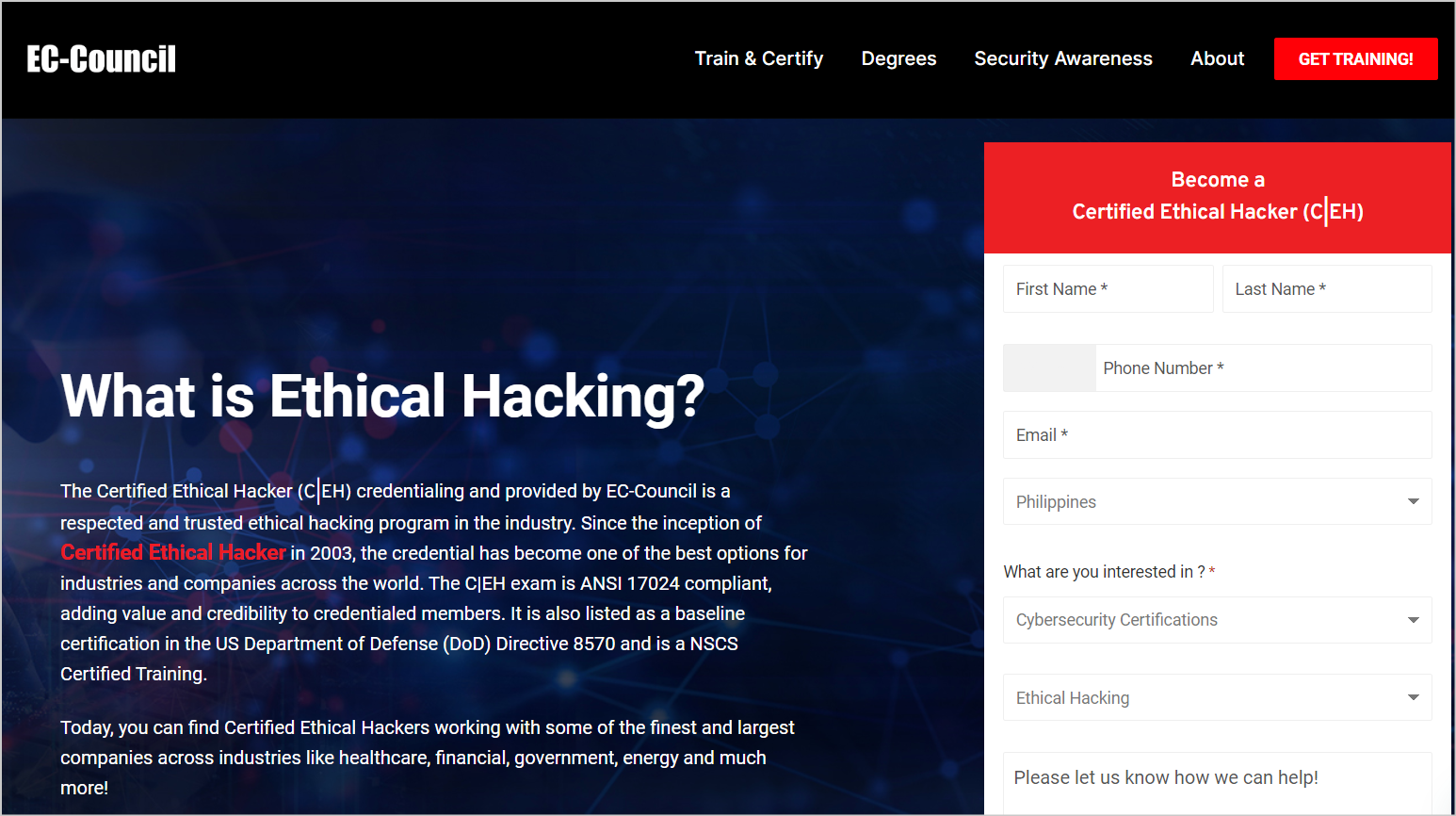
Certified Ethical Hacker (CEH) is an information security certification offered by the EC-Council. It is a course designed to teach experienced IT professionals how to identify, assess, and prevent malicious cyber threats and security breaches. The program covers topics such as network security, cryptography, ethical hacking, and risk management topics and provides hands-on training in real-world scenarios.
Offensive Security Certified Professional (OSCP)
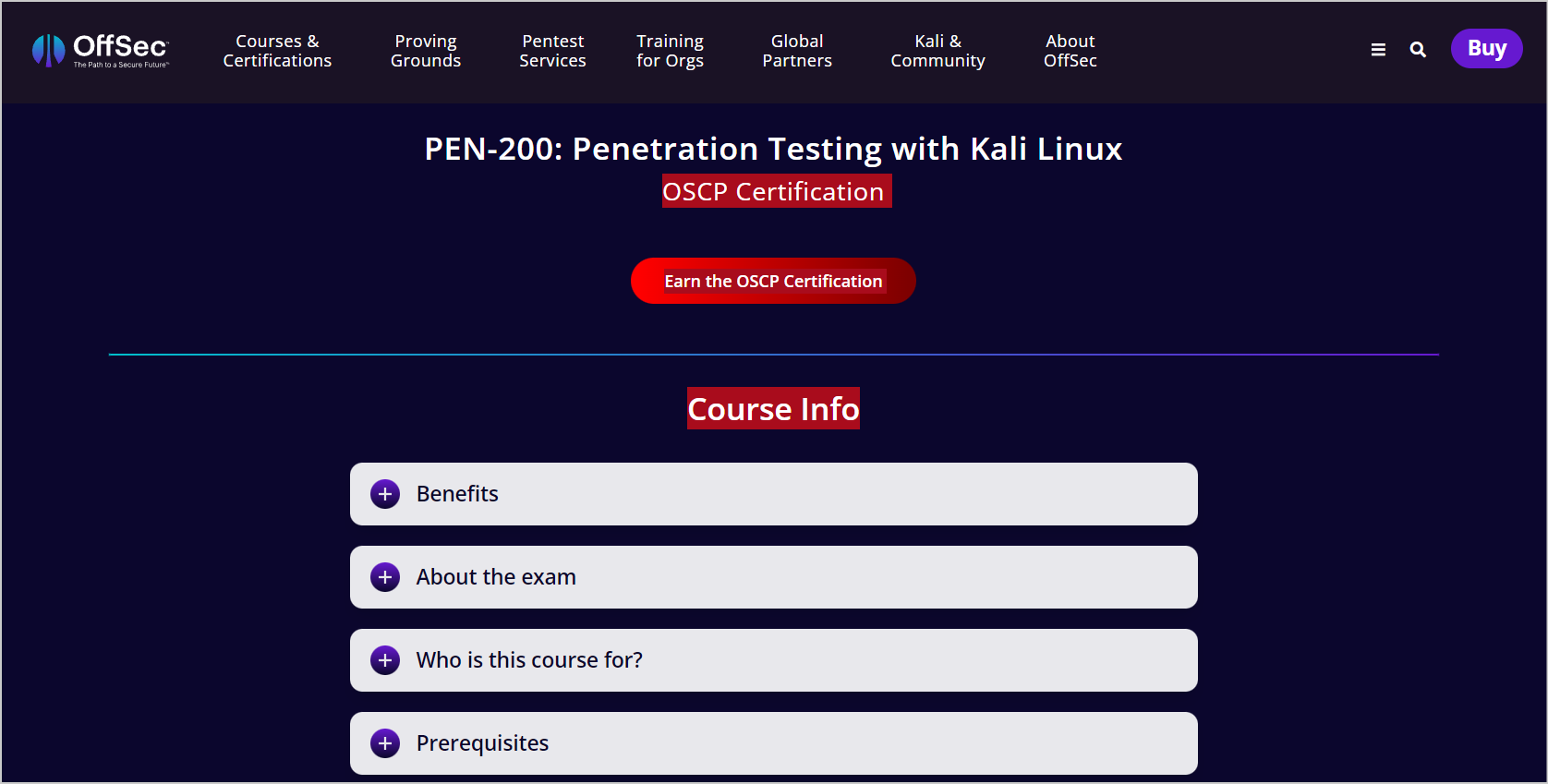
Offensive Security Certified Professional (OSCP) is a certification that tests and validates a student’s knowledge and skills in penetration testing. The OSCP certification is highly sought after by IT professionals looking to demonstrate their proficiency in the cybersecurity field and is considered one of the industry’s most respected certifications.
Your Network Is Your Net Worth
Networking can increase job opportunities and expand an ethical hacker’s professional network. Here’s how to do it.
Share relevant content related to ethical hacking on your LinkedIn profile to demonstrate your expertise in the field. This will help to attract the attention of other professionals and potential employers.
Online Communities
Participating in online forums and discussion boards is a great way to expand your network and connect with other ethical hackers. Here, you can ask questions, receive guidance and advice, and learn from the experiences of others. Ethical hackers often spend time on Slack communities and Discord.
Conferences and Meet-Ups
Attendees at conferences and meetups are often interested in expanding their network and are eager to meet new people. Don’t be afraid to ask questions and offer insights into the discussed topics. This will help you demonstrate your knowledge and interest in the subject, which can help you build relationships with other attendees.
Polish Your Resume, Apply for Entry-Level Roles, and Start Climbing
Oftentimes, ethical hackers start in broader, entry-level cybersecurity roles before advancing, and it’s common for cybersecurity professionals to specialize as their careers progress. The experience you gain in these entry-level roles can help you understand the cybersecurity field better and allow you to network with experienced professionals who can offer advice and support along the way.
Related Read: Cybersecurity Resume Examples and Tips to Get You Hired
How Much Can You Earn as an Ethical Hacker?
Ethical hacking is a growing field and has become a lucrative career option for many. Let’s explore how much money you can make as an ethical hacker.
Entry-Level
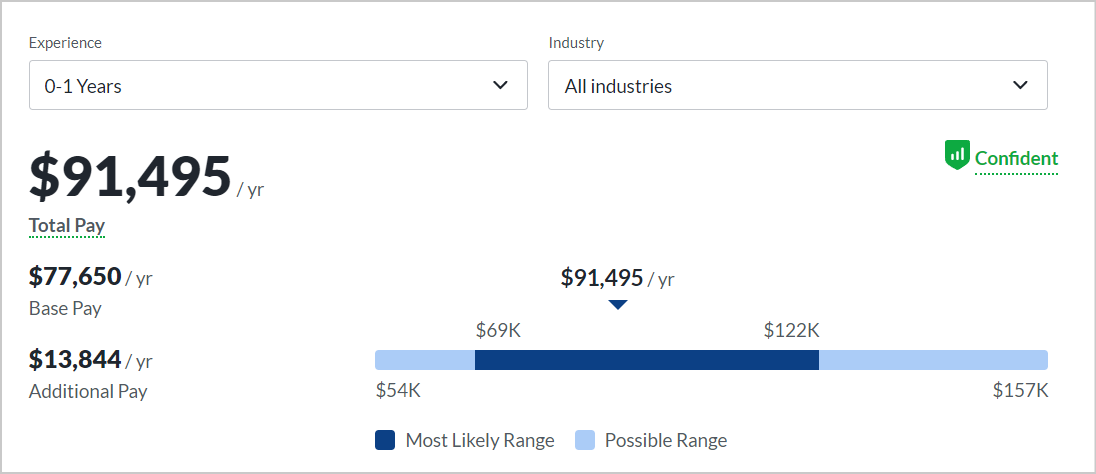
An ethical hacker with less than one year of experience earns an average salary of $91,495 annually.
Mid-Level
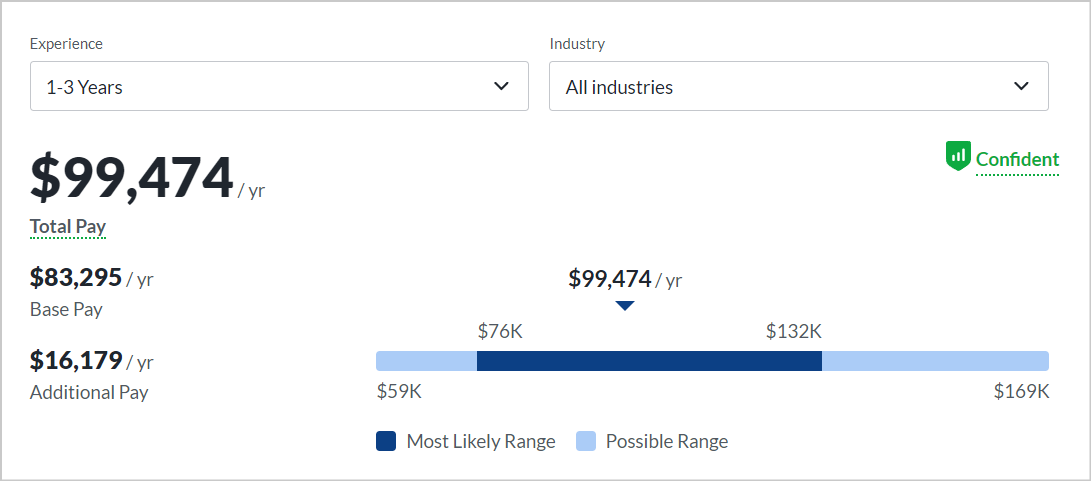
Mid-level ethical hackers can earn an average of $99,474 annually.
Senior-Level
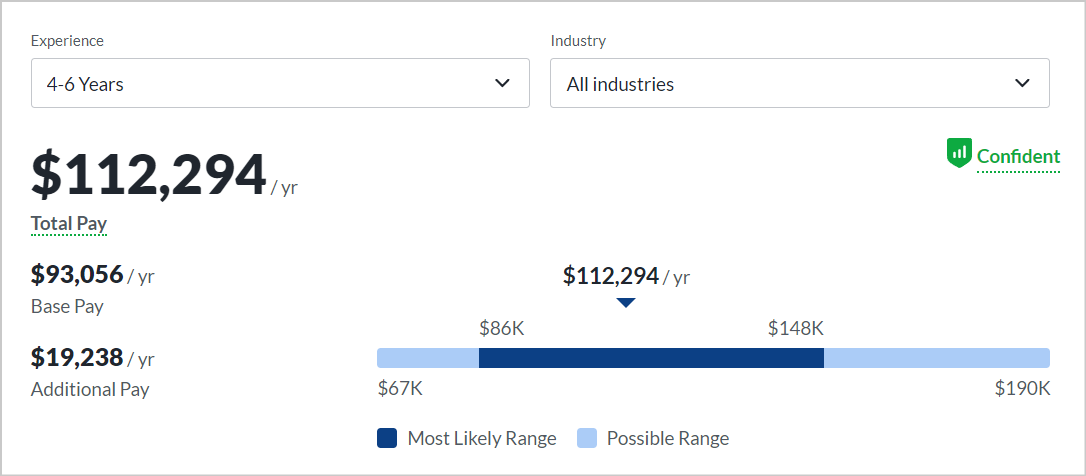
Senior-level ethical hackers with more than five years of experience earn an average salary of $112,294 per year.
Freelance

Freelance ethical hackers are paid depending on their experience and skill level. An experienced freelancer can expect to earn around $107,966 per year.
Ethical Hacking Job Titles
Here’s an overview of some of the most common job titles related to ethical hacking.
Penetration Tester
A penetration tester is a computer and network security professional who tests the security of computer systems, networks, applications, and systems by simulating real-world phishing attack scenarios. Penetration testing is used to identify vulnerabilities and assess the safety of a system or application.
Vulnerability Analyst
A vulnerability analyst is a cybersecurity specialist who identifies, analyzes, and assesses the risks posed by vulnerabilities and advises the organization on ways to mitigate these risks. Vulnerability analysts are also responsible for reporting security incidents.
Security Auditor
Security auditors evaluate an organization’s security policies and procedures, network architecture, and security systems to identify potential security weaknesses and recommend corrective measures to improve security. They also review audit logs and investigate any security incidents that occur.
Information Security Analyst
An information security analyst is responsible for developing policies and procedures to ensure the safety of sensitive data, and they may also suggest hardware and software upgrades to improve security.
Get To Know Other Cybersecurity Students
Dylan Wood
Cyber Threat Analyst at Trustwave Government Solutions
Eric Rivera
IAM Security Specialist at Dearborn Group
Rafael Ayala
Mergers And Acquisitions at Autodesk
Where Can You Find Ethical Hacking Jobs?
If you’re looking for a rewarding ethical hacking career, you’ll want to know where to find the best job opportunities.
Job Boards
Search job boards such as Indeed, Monster, and ZipRecruiter for job postings. When searching, it is important to use keywords such as “cybersecurity,” “ethical hacker,” “penetration testing,” and “information security” to narrow down the search.
Create a LinkedIn profile that highlights your experience and any ethical hacking certifications. Make sure to connect with relevant contacts and join relevant groups to participate in conversations. LinkedIn’s “Advanced Search” feature is handy for searching specific ethical hacking jobs.
Network
Start by attending conferences and other events related to ethical hacking. Introduce yourself and share your experience and skills with other attendees. Don’t forget to leverage your network of contacts to find out about job openings and potential opportunities.
How To Become an Ethical Hacker FAQs
We’ve got the answers to your most frequently asked questions.
Can You Become an Ethical Hacker Without a Degree?
Yes, it is possible to become an ethical hacker without a degree. Many certifications and ethical hacking courses can help you learn the skills needed to become an ethical hacker. Many employers are also willing to hire ethical hackers who have not earned a degree but have demonstrated their hacking proficiency through certifications or other qualifications.
How Long Does It Take To Become an Ethical Hacker?
It typically takes 1-3 years to become an ethical hacker. This time frame depends on the individual’s experience, skill level, and background in technology.
How Can I Build a Career as a Freelance Ethical Hacker?
There are a few steps you can take to become a freelance ethical hacker, including but not limited to the following:
1. Getting a degree in cybersecurity or computer science
2. Getting certified in a wide range of ethical hacking techniques
3. Building a portfolio and including examples of ethical hacking projects you’ve completed
4. Networking with ethical hackers and building relationships with other professionals in the field
Since you’re here…
There are hundreds of thousands of vacant cybersecurity jobs, and one of them has your name on it. You can enter the industry in 6 months flat with our Cybersecurity Course. We’ve helped over 10,000 students make huge career changes with our fully flexible mentor-led bootcamps. Explore our free cybersecurity course curriculum today to start your career switch story.





![How To Become a Freelance Cybersecurity Expert [2023 Guide]](https://www.springboard.com/blog/wp-content/uploads/2023/10/how-to-become-a-freelance-cybersecurity-expert-2023-guide-380x235.jpeg)
